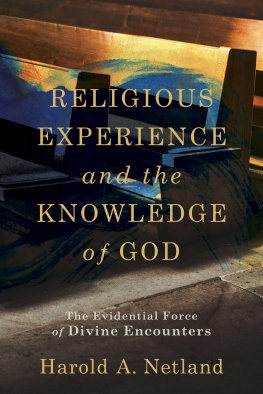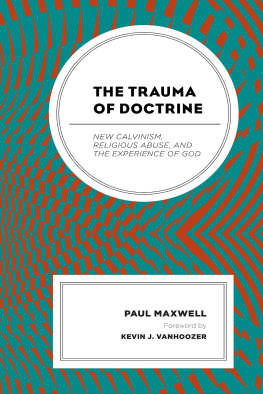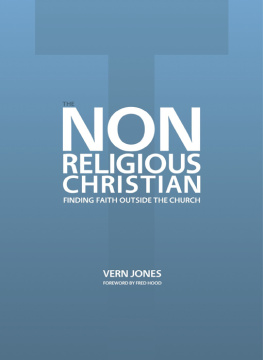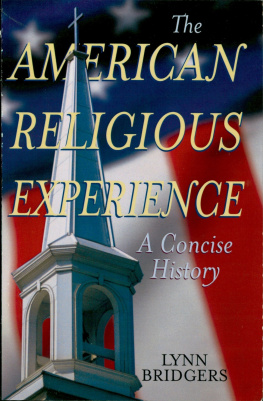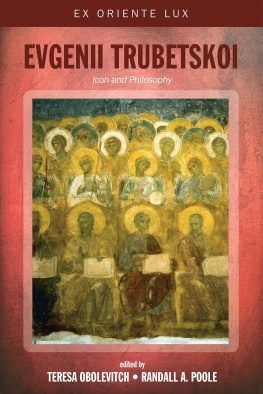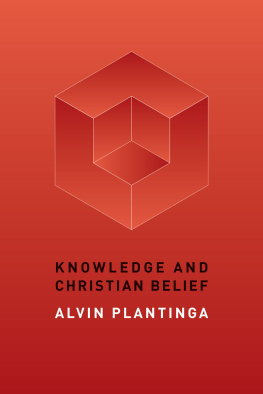I have been thinking about the issues in this book for a long time, as they have been part of classes I have taught at Trinity Evangelical Divinity School (TEDS) and elsewhere over the past twenty-five years. The comments and questions of many people over the years have helped me to sharpen my own thinking and, at times, to modify my views on some issues. I cannot possibly mention everyone here, but special acknowledgment is due to my excellent students at TEDS, especially those in the religious epistemology classes. I am also very grateful for colleagues and friends who were willing to read and comment on drafts of these chapters, including Doug Geivett, Wilson Jeremiah, David Luy, Tom McCall, Justin Mooney, Doug Sweeney, Stephen Williams, and David Yandell. Once again, I am deeply grateful to Jim Kinney, Wells Turner, and the fine production team at Baker Academic for their professionalism, encouragement, and guidance at each stage of the writing, editing, and publication process.
I was blessed in having Keith Yandell (19382020), for many years professor of philosophy at the University of WisconsinMadison, as a friend and colleague (he taught part time at Trinity for many years). The issues in this book were subjects of spirited discussions with Keith on many occasions. I learned much from him. It is with deep appreciation for Keith as an exemplary Christian thinker and a wonderful human being that I dedicate this book to him.
Introduction
I n 1985 my wife Ruth and I moved from the lovely city of Kyoto, Japan, to a community in western Tokyo. We were expecting our first child and did not yet know many people in the area. One day my wife returned from the maternity clinic excited because she had met an American who, like Ruth, was a graduate of the University of Minnesota. Americans were unusual in that part of Tokyo, so Ruth invited her to our home for coffee, anticipating an afternoon of fun conversation about Minnesota and things they had in common. But when the woman came to visit Ruth, the conversation began on a surprising note. Upon entering our home, she immediately turned to Ruth and said, Let me tell you how I found perfect peace and happiness in Soka Gakkai Buddhism. She proceeded to give a powerful account of how meditation and practicing Buddhist precepts had completely transformed her life. Ruth was shocked. Change a few key words here and there, she remarked, and it could have been a beautiful Christian testimony! The woman had met her Japanese husband while he was an international student at the University of Minnesota. Through his influence, she became a Buddhist, and now the couple was living in Tokyo, where she served as a leader in the local Soka Gakkai community.
There are a number of intriguing aspects to this encounter. The woman, a white American from the Midwest, was a convert to Buddhism. She is just one of a growing number of Americans who embrace religions such as Hinduism, Buddhism, or Islam, traditions generally not associated with American society. But the American religious landscape today is fluid and very diverse, with conversions and deconversions flowing in many directions.
But listening to reports like these can be disconcerting for Christians who have been taught that such experiences are unique to Christianity and that a personal story about how Jesus changed ones life is the most powerful evangelistic tool we can employ. The idea that Buddhists, Hindus, and Muslims also have compelling personal testimonies just doesnt seem right.
At the heart of this womans story was personal experience. She did not launch into esoteric arguments supporting the Four Noble Truths or the doctrine of dependent co-origination. Nor did she appeal to the divine inspiration of Buddhist sutras, since there is no God in Buddhism to inspire sutras. She simply shared her experience of finding peace, meaning, and happiness through Buddhist meditation. This, too, has parallels with the approach of many Christians who place a premium on a personal experience of God and minimize, if not ignore entirely, any appeal to evidence or reasons in support of Christian teachings.
But if personal experience is the sole or even primary factor in determining whether to accept particular religious claims, there would be little for Ruth to say in response to the womans testimony. Her experience provided what she was looking for. Relying only on personal experience, an appropriate response to her would be, Im so glad that you have found something that meets your needs and gives you peace and meaning. As for me, Ive found meaning and peace in Jesus. End of conversation. Unless one appeals to reasons for religious commitments that are independent of the experience itself, there is little one can say to the woman about why she should abandon Buddhist teachings and accept Jesus as Lord.
Religious experiences are significant, for in one form or another, they are a common and important part of life for many people around the world today. Despite the significant increase in those who self-identify as nonreligious, most people worldwide continue to have religious affiliation of some kind and engage in religious activities. Experiences, both personal and corporate, ordinary and unusual, are a central part of vibrant religious communities.
In addition to ordinary experiences, there are also the more unusual and dramatic experiences of those who have visions of Jesus or dreams in which God is said to communicate directly to them. Scripture itself is full of examples of God or angelic beings appearing in dreams or visions to individuals or groups. The history of Christianity is replete with examples of those claiming to have directly encountered God, Jesus, or an angelic being in a vision, dream, or other perceptual experience. Many people around the world today report experiences in which Jesus appears to them.
A testimonya personal account of how ones conversion to Jesus Christ through the supernatural work of the Holy Spirit results in a dramatically changed lifegives voice to an especially important kind of experience. The narrative of personal transformation, expressed powerfully in the dramatic statement of the blind man in John 9:25One thing I do know. I was blind but now I see!has always been significant for Christians. But it took on special meaning in the early modern era with the rise of the Puritans and Pietists. accompanied by ongoing personal experiences of Gods presence, has become a central feature of modern Protestant, and especially evangelical, Christianity.

